End of Module Report: Analyzing the WTO's Successes and Failures
VerifiedAdded on 2023/01/04
|9
|3277
|79
Report
AI Summary
This report analyzes the World Trade Organization (WTO), examining its successes and failures in achieving its stated aims. The report begins with an overview of the WTO's formation, its role in global trade, and its dispute settlement mechanism. It then explores the mixed reactions to the WTO, highlighting arguments for its success, such as the reduction of global trade wars and trade barriers, and its benefits for developing nations. The report then focuses on the failures of the WTO, particularly concerning its anti-dumping policies and agreements on countervailing subsidies. It explains how these policies, designed to protect domestic markets, have often proven ineffective due to complex administrative procedures, difficulties in proving harm, and the dominance of larger nations. The analysis delves into the challenges in measuring the impact of dumping and subsidies, the political and economic imbalances created, and the WTO's passive role in controlling these practices, ultimately arguing that the WTO has failed to provide equal opportunities for all countries in trade wars and has not developed active policies to address the root causes of trade imbalances.
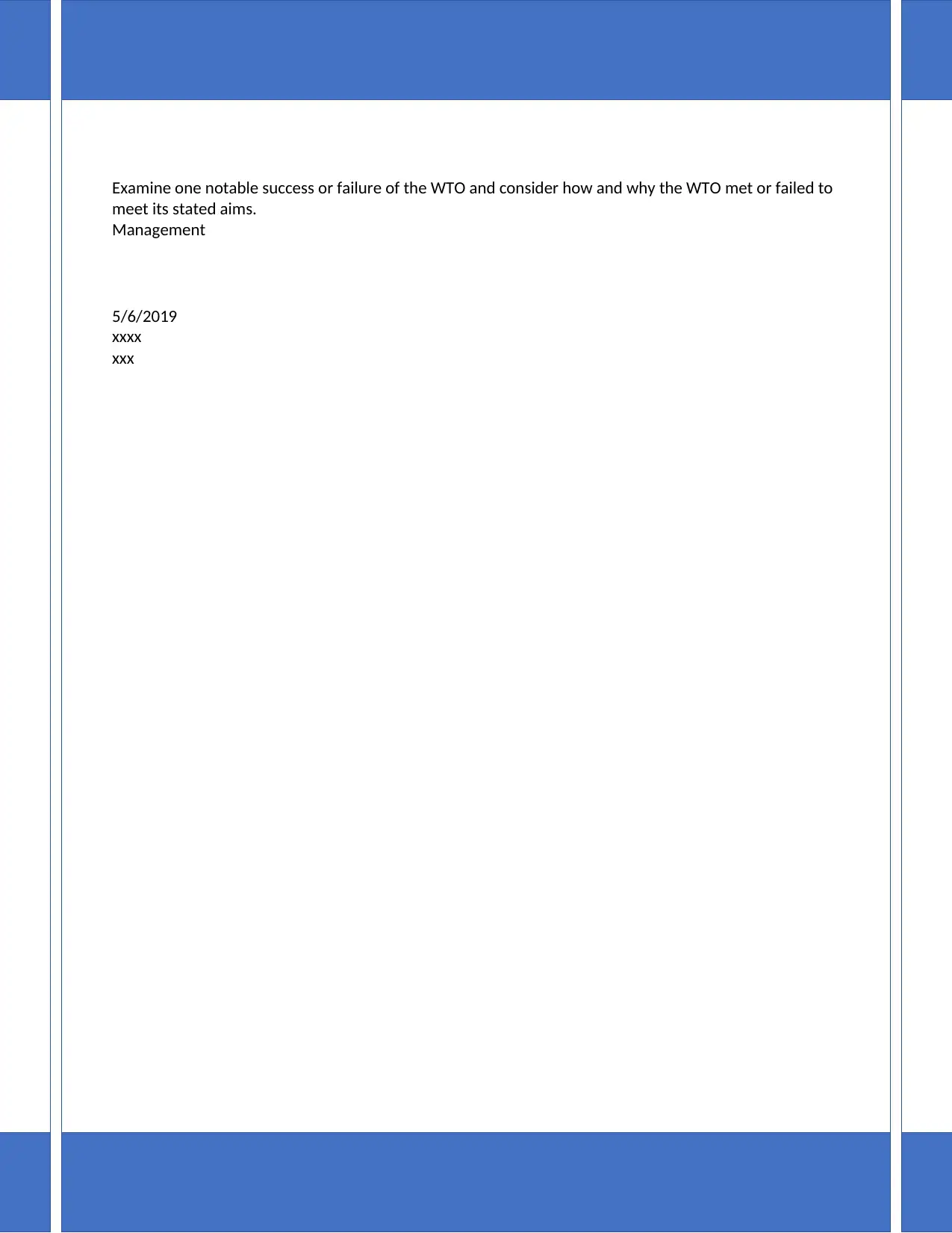
Examine one notable success or failure of the WTO and consider how and why the WTO met or failed to
meet its stated aims.
Management
5/6/2019
xxxx
xxx
meet its stated aims.
Management
5/6/2019
xxxx
xxx
Paraphrase This Document
Need a fresh take? Get an instant paraphrase of this document with our AI Paraphraser
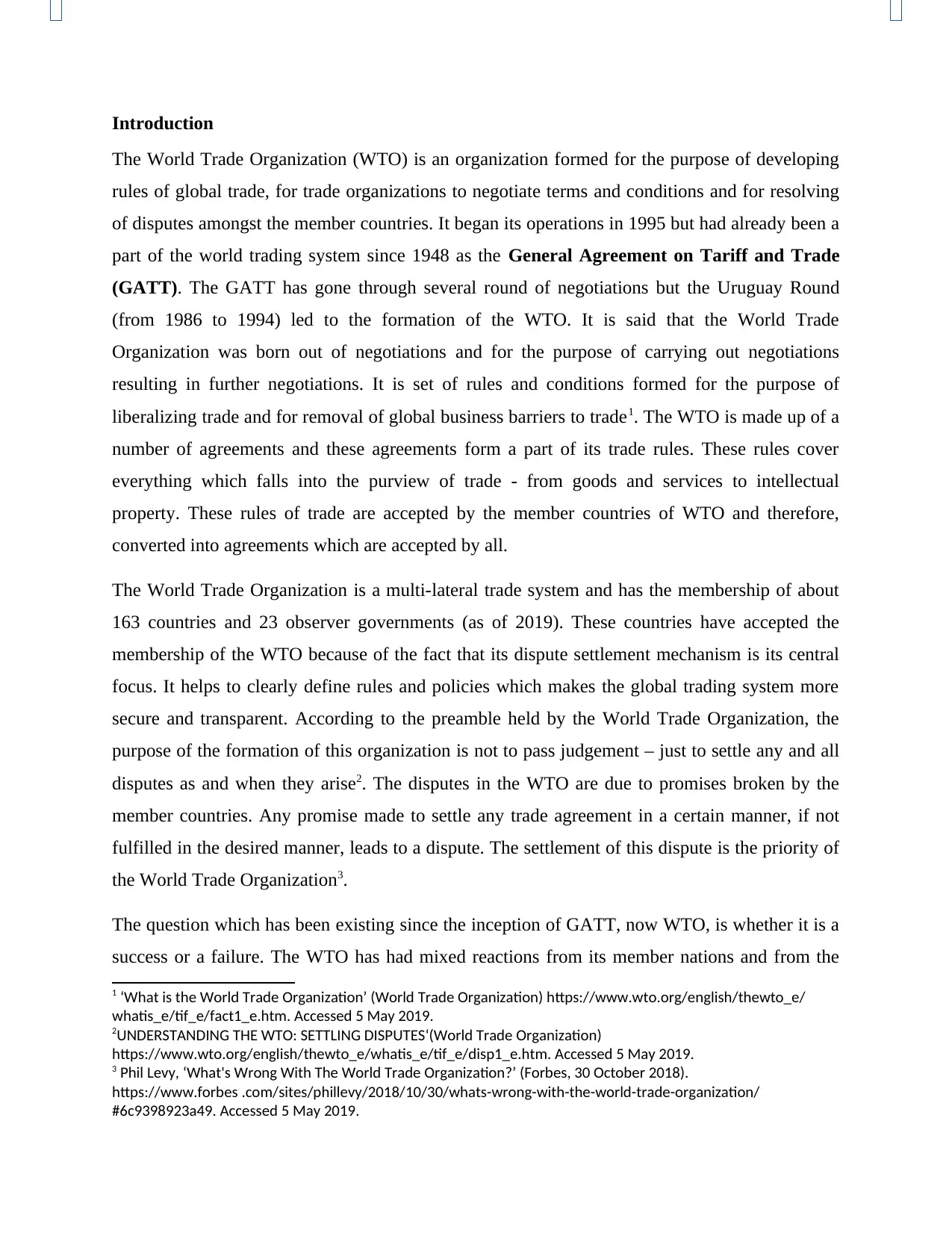
Introduction
The World Trade Organization (WTO) is an organization formed for the purpose of developing
rules of global trade, for trade organizations to negotiate terms and conditions and for resolving
of disputes amongst the member countries. It began its operations in 1995 but had already been a
part of the world trading system since 1948 as the General Agreement on Tariff and Trade
(GATT). The GATT has gone through several round of negotiations but the Uruguay Round
(from 1986 to 1994) led to the formation of the WTO. It is said that the World Trade
Organization was born out of negotiations and for the purpose of carrying out negotiations
resulting in further negotiations. It is set of rules and conditions formed for the purpose of
liberalizing trade and for removal of global business barriers to trade1. The WTO is made up of a
number of agreements and these agreements form a part of its trade rules. These rules cover
everything which falls into the purview of trade - from goods and services to intellectual
property. These rules of trade are accepted by the member countries of WTO and therefore,
converted into agreements which are accepted by all.
The World Trade Organization is a multi-lateral trade system and has the membership of about
163 countries and 23 observer governments (as of 2019). These countries have accepted the
membership of the WTO because of the fact that its dispute settlement mechanism is its central
focus. It helps to clearly define rules and policies which makes the global trading system more
secure and transparent. According to the preamble held by the World Trade Organization, the
purpose of the formation of this organization is not to pass judgement – just to settle any and all
disputes as and when they arise2. The disputes in the WTO are due to promises broken by the
member countries. Any promise made to settle any trade agreement in a certain manner, if not
fulfilled in the desired manner, leads to a dispute. The settlement of this dispute is the priority of
the World Trade Organization3.
The question which has been existing since the inception of GATT, now WTO, is whether it is a
success or a failure. The WTO has had mixed reactions from its member nations and from the
1 ‘What is the World Trade Organization’ (World Trade Organization) https://www.wto.org/english/thewto_e/
whatis_e/tif_e/fact1_e.htm. Accessed 5 May 2019.
2UNDERSTANDING THE WTO: SETTLING DISPUTES‘(World Trade Organization)
https://www.wto.org/english/thewto_e/whatis_e/tif_e/disp1_e.htm. Accessed 5 May 2019.
3 Phil Levy, ‘What's Wrong With The World Trade Organization?’ (Forbes, 30 October 2018).
https://www.forbes .com/sites/phillevy/2018/10/30/whats-wrong-with-the-world-trade-organization/
#6c9398923a49. Accessed 5 May 2019.
The World Trade Organization (WTO) is an organization formed for the purpose of developing
rules of global trade, for trade organizations to negotiate terms and conditions and for resolving
of disputes amongst the member countries. It began its operations in 1995 but had already been a
part of the world trading system since 1948 as the General Agreement on Tariff and Trade
(GATT). The GATT has gone through several round of negotiations but the Uruguay Round
(from 1986 to 1994) led to the formation of the WTO. It is said that the World Trade
Organization was born out of negotiations and for the purpose of carrying out negotiations
resulting in further negotiations. It is set of rules and conditions formed for the purpose of
liberalizing trade and for removal of global business barriers to trade1. The WTO is made up of a
number of agreements and these agreements form a part of its trade rules. These rules cover
everything which falls into the purview of trade - from goods and services to intellectual
property. These rules of trade are accepted by the member countries of WTO and therefore,
converted into agreements which are accepted by all.
The World Trade Organization is a multi-lateral trade system and has the membership of about
163 countries and 23 observer governments (as of 2019). These countries have accepted the
membership of the WTO because of the fact that its dispute settlement mechanism is its central
focus. It helps to clearly define rules and policies which makes the global trading system more
secure and transparent. According to the preamble held by the World Trade Organization, the
purpose of the formation of this organization is not to pass judgement – just to settle any and all
disputes as and when they arise2. The disputes in the WTO are due to promises broken by the
member countries. Any promise made to settle any trade agreement in a certain manner, if not
fulfilled in the desired manner, leads to a dispute. The settlement of this dispute is the priority of
the World Trade Organization3.
The question which has been existing since the inception of GATT, now WTO, is whether it is a
success or a failure. The WTO has had mixed reactions from its member nations and from the
1 ‘What is the World Trade Organization’ (World Trade Organization) https://www.wto.org/english/thewto_e/
whatis_e/tif_e/fact1_e.htm. Accessed 5 May 2019.
2UNDERSTANDING THE WTO: SETTLING DISPUTES‘(World Trade Organization)
https://www.wto.org/english/thewto_e/whatis_e/tif_e/disp1_e.htm. Accessed 5 May 2019.
3 Phil Levy, ‘What's Wrong With The World Trade Organization?’ (Forbes, 30 October 2018).
https://www.forbes .com/sites/phillevy/2018/10/30/whats-wrong-with-the-world-trade-organization/
#6c9398923a49. Accessed 5 May 2019.
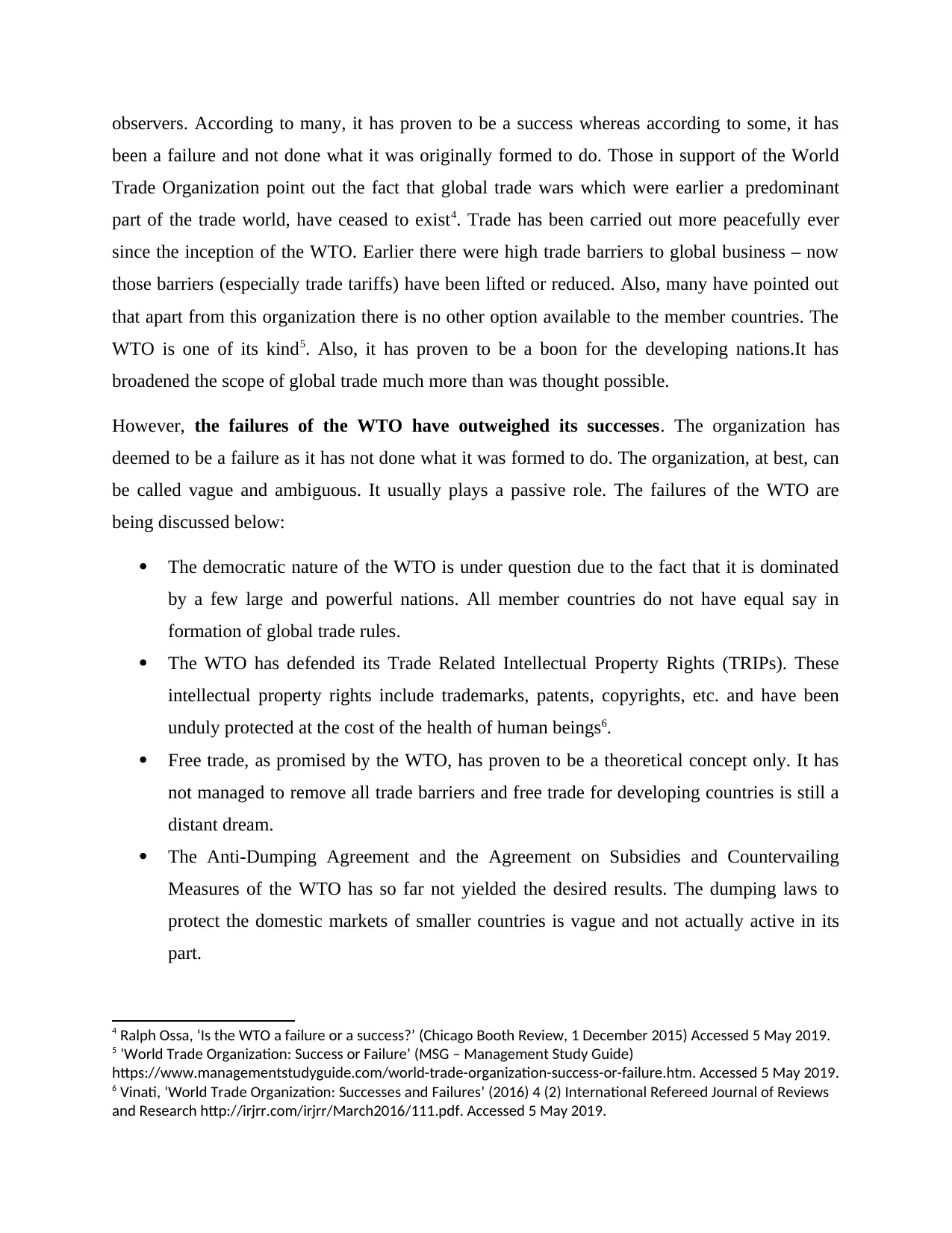
observers. According to many, it has proven to be a success whereas according to some, it has
been a failure and not done what it was originally formed to do. Those in support of the World
Trade Organization point out the fact that global trade wars which were earlier a predominant
part of the trade world, have ceased to exist4. Trade has been carried out more peacefully ever
since the inception of the WTO. Earlier there were high trade barriers to global business – now
those barriers (especially trade tariffs) have been lifted or reduced. Also, many have pointed out
that apart from this organization there is no other option available to the member countries. The
WTO is one of its kind5. Also, it has proven to be a boon for the developing nations.It has
broadened the scope of global trade much more than was thought possible.
However, the failures of the WTO have outweighed its successes. The organization has
deemed to be a failure as it has not done what it was formed to do. The organization, at best, can
be called vague and ambiguous. It usually plays a passive role. The failures of the WTO are
being discussed below:
The democratic nature of the WTO is under question due to the fact that it is dominated
by a few large and powerful nations. All member countries do not have equal say in
formation of global trade rules.
The WTO has defended its Trade Related Intellectual Property Rights (TRIPs). These
intellectual property rights include trademarks, patents, copyrights, etc. and have been
unduly protected at the cost of the health of human beings6.
Free trade, as promised by the WTO, has proven to be a theoretical concept only. It has
not managed to remove all trade barriers and free trade for developing countries is still a
distant dream.
The Anti-Dumping Agreement and the Agreement on Subsidies and Countervailing
Measures of the WTO has so far not yielded the desired results. The dumping laws to
protect the domestic markets of smaller countries is vague and not actually active in its
part.
4 Ralph Ossa, ‘Is the WTO a failure or a success?’ (Chicago Booth Review, 1 December 2015) Accessed 5 May 2019.
5 ‘World Trade Organization: Success or Failure’ (MSG – Management Study Guide)
https://www.managementstudyguide.com/world-trade-organization-success-or-failure.htm. Accessed 5 May 2019.
6 Vinati, ‘World Trade Organization: Successes and Failures’ (2016) 4 (2) International Refereed Journal of Reviews
and Research http://irjrr.com/irjrr/March2016/111.pdf. Accessed 5 May 2019.
been a failure and not done what it was originally formed to do. Those in support of the World
Trade Organization point out the fact that global trade wars which were earlier a predominant
part of the trade world, have ceased to exist4. Trade has been carried out more peacefully ever
since the inception of the WTO. Earlier there were high trade barriers to global business – now
those barriers (especially trade tariffs) have been lifted or reduced. Also, many have pointed out
that apart from this organization there is no other option available to the member countries. The
WTO is one of its kind5. Also, it has proven to be a boon for the developing nations.It has
broadened the scope of global trade much more than was thought possible.
However, the failures of the WTO have outweighed its successes. The organization has
deemed to be a failure as it has not done what it was formed to do. The organization, at best, can
be called vague and ambiguous. It usually plays a passive role. The failures of the WTO are
being discussed below:
The democratic nature of the WTO is under question due to the fact that it is dominated
by a few large and powerful nations. All member countries do not have equal say in
formation of global trade rules.
The WTO has defended its Trade Related Intellectual Property Rights (TRIPs). These
intellectual property rights include trademarks, patents, copyrights, etc. and have been
unduly protected at the cost of the health of human beings6.
Free trade, as promised by the WTO, has proven to be a theoretical concept only. It has
not managed to remove all trade barriers and free trade for developing countries is still a
distant dream.
The Anti-Dumping Agreement and the Agreement on Subsidies and Countervailing
Measures of the WTO has so far not yielded the desired results. The dumping laws to
protect the domestic markets of smaller countries is vague and not actually active in its
part.
4 Ralph Ossa, ‘Is the WTO a failure or a success?’ (Chicago Booth Review, 1 December 2015) Accessed 5 May 2019.
5 ‘World Trade Organization: Success or Failure’ (MSG – Management Study Guide)
https://www.managementstudyguide.com/world-trade-organization-success-or-failure.htm. Accessed 5 May 2019.
6 Vinati, ‘World Trade Organization: Successes and Failures’ (2016) 4 (2) International Refereed Journal of Reviews
and Research http://irjrr.com/irjrr/March2016/111.pdf. Accessed 5 May 2019.
⊘ This is a preview!⊘
Do you want full access?
Subscribe today to unlock all pages.

Trusted by 1+ million students worldwide
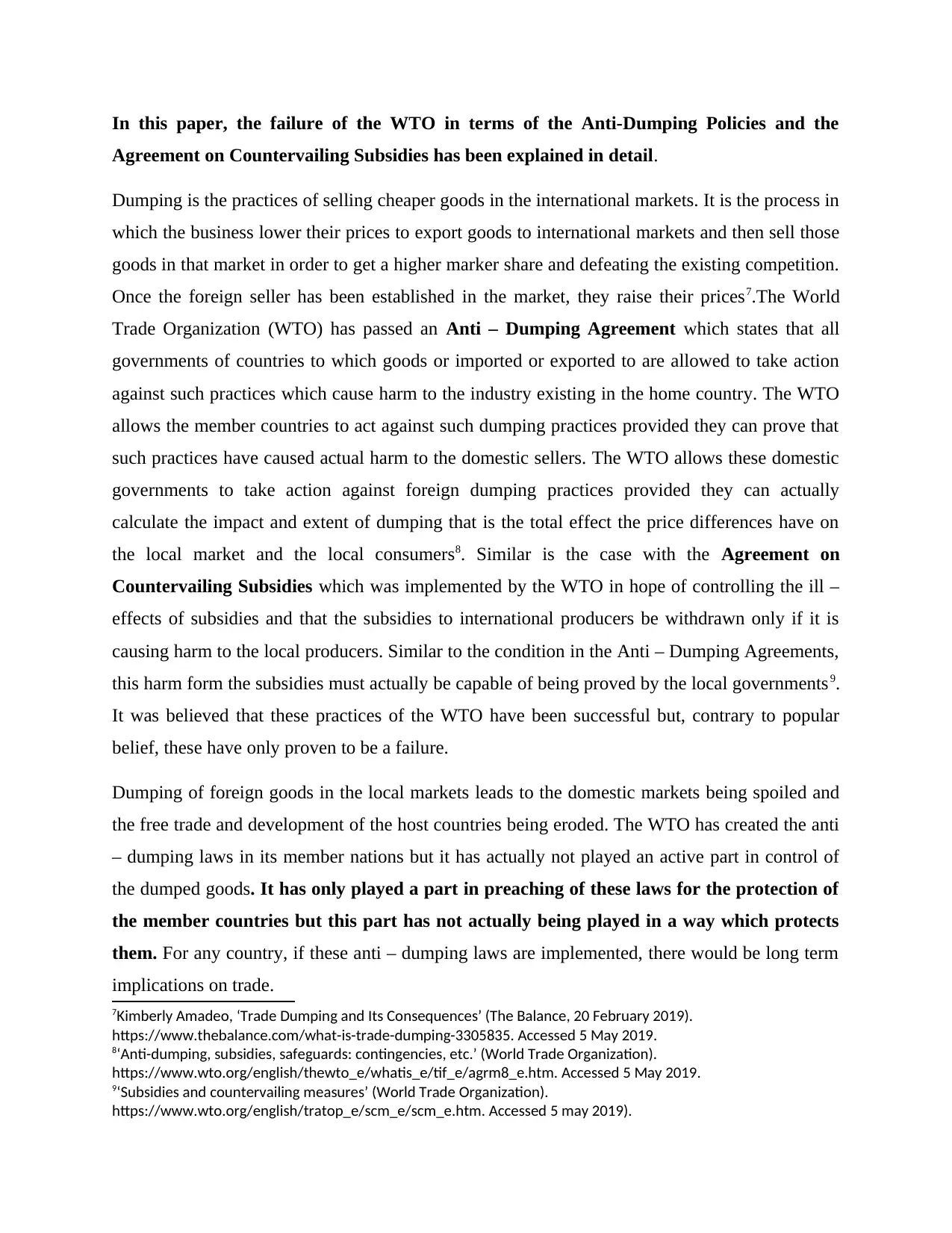
In this paper, the failure of the WTO in terms of the Anti-Dumping Policies and the
Agreement on Countervailing Subsidies has been explained in detail.
Dumping is the practices of selling cheaper goods in the international markets. It is the process in
which the business lower their prices to export goods to international markets and then sell those
goods in that market in order to get a higher marker share and defeating the existing competition.
Once the foreign seller has been established in the market, they raise their prices7.The World
Trade Organization (WTO) has passed an Anti – Dumping Agreement which states that all
governments of countries to which goods or imported or exported to are allowed to take action
against such practices which cause harm to the industry existing in the home country. The WTO
allows the member countries to act against such dumping practices provided they can prove that
such practices have caused actual harm to the domestic sellers. The WTO allows these domestic
governments to take action against foreign dumping practices provided they can actually
calculate the impact and extent of dumping that is the total effect the price differences have on
the local market and the local consumers8. Similar is the case with the Agreement on
Countervailing Subsidies which was implemented by the WTO in hope of controlling the ill –
effects of subsidies and that the subsidies to international producers be withdrawn only if it is
causing harm to the local producers. Similar to the condition in the Anti – Dumping Agreements,
this harm form the subsidies must actually be capable of being proved by the local governments9.
It was believed that these practices of the WTO have been successful but, contrary to popular
belief, these have only proven to be a failure.
Dumping of foreign goods in the local markets leads to the domestic markets being spoiled and
the free trade and development of the host countries being eroded. The WTO has created the anti
– dumping laws in its member nations but it has actually not played an active part in control of
the dumped goods. It has only played a part in preaching of these laws for the protection of
the member countries but this part has not actually being played in a way which protects
them. For any country, if these anti – dumping laws are implemented, there would be long term
implications on trade.
7Kimberly Amadeo, ‘Trade Dumping and Its Consequences’ (The Balance, 20 February 2019).
https://www.thebalance.com/what-is-trade-dumping-3305835. Accessed 5 May 2019.
8‘Anti-dumping, subsidies, safeguards: contingencies, etc.’ (World Trade Organization).
https://www.wto.org/english/thewto_e/whatis_e/tif_e/agrm8_e.htm. Accessed 5 May 2019.
9‘Subsidies and countervailing measures’ (World Trade Organization).
https://www.wto.org/english/tratop_e/scm_e/scm_e.htm. Accessed 5 may 2019).
Agreement on Countervailing Subsidies has been explained in detail.
Dumping is the practices of selling cheaper goods in the international markets. It is the process in
which the business lower their prices to export goods to international markets and then sell those
goods in that market in order to get a higher marker share and defeating the existing competition.
Once the foreign seller has been established in the market, they raise their prices7.The World
Trade Organization (WTO) has passed an Anti – Dumping Agreement which states that all
governments of countries to which goods or imported or exported to are allowed to take action
against such practices which cause harm to the industry existing in the home country. The WTO
allows the member countries to act against such dumping practices provided they can prove that
such practices have caused actual harm to the domestic sellers. The WTO allows these domestic
governments to take action against foreign dumping practices provided they can actually
calculate the impact and extent of dumping that is the total effect the price differences have on
the local market and the local consumers8. Similar is the case with the Agreement on
Countervailing Subsidies which was implemented by the WTO in hope of controlling the ill –
effects of subsidies and that the subsidies to international producers be withdrawn only if it is
causing harm to the local producers. Similar to the condition in the Anti – Dumping Agreements,
this harm form the subsidies must actually be capable of being proved by the local governments9.
It was believed that these practices of the WTO have been successful but, contrary to popular
belief, these have only proven to be a failure.
Dumping of foreign goods in the local markets leads to the domestic markets being spoiled and
the free trade and development of the host countries being eroded. The WTO has created the anti
– dumping laws in its member nations but it has actually not played an active part in control of
the dumped goods. It has only played a part in preaching of these laws for the protection of
the member countries but this part has not actually being played in a way which protects
them. For any country, if these anti – dumping laws are implemented, there would be long term
implications on trade.
7Kimberly Amadeo, ‘Trade Dumping and Its Consequences’ (The Balance, 20 February 2019).
https://www.thebalance.com/what-is-trade-dumping-3305835. Accessed 5 May 2019.
8‘Anti-dumping, subsidies, safeguards: contingencies, etc.’ (World Trade Organization).
https://www.wto.org/english/thewto_e/whatis_e/tif_e/agrm8_e.htm. Accessed 5 May 2019.
9‘Subsidies and countervailing measures’ (World Trade Organization).
https://www.wto.org/english/tratop_e/scm_e/scm_e.htm. Accessed 5 may 2019).
Paraphrase This Document
Need a fresh take? Get an instant paraphrase of this document with our AI Paraphraser
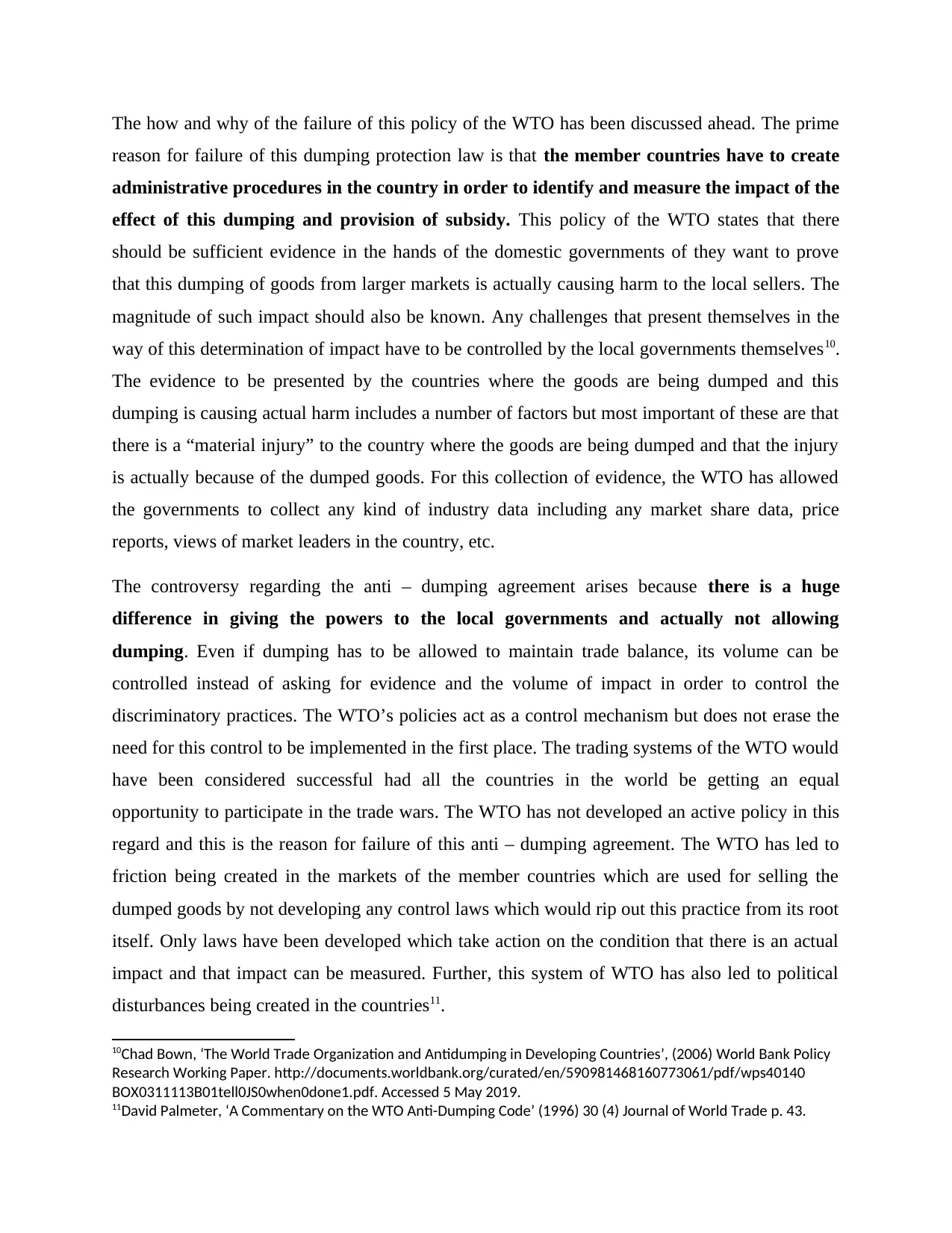
The how and why of the failure of this policy of the WTO has been discussed ahead. The prime
reason for failure of this dumping protection law is that the member countries have to create
administrative procedures in the country in order to identify and measure the impact of the
effect of this dumping and provision of subsidy. This policy of the WTO states that there
should be sufficient evidence in the hands of the domestic governments of they want to prove
that this dumping of goods from larger markets is actually causing harm to the local sellers. The
magnitude of such impact should also be known. Any challenges that present themselves in the
way of this determination of impact have to be controlled by the local governments themselves10.
The evidence to be presented by the countries where the goods are being dumped and this
dumping is causing actual harm includes a number of factors but most important of these are that
there is a “material injury” to the country where the goods are being dumped and that the injury
is actually because of the dumped goods. For this collection of evidence, the WTO has allowed
the governments to collect any kind of industry data including any market share data, price
reports, views of market leaders in the country, etc.
The controversy regarding the anti – dumping agreement arises because there is a huge
difference in giving the powers to the local governments and actually not allowing
dumping. Even if dumping has to be allowed to maintain trade balance, its volume can be
controlled instead of asking for evidence and the volume of impact in order to control the
discriminatory practices. The WTO’s policies act as a control mechanism but does not erase the
need for this control to be implemented in the first place. The trading systems of the WTO would
have been considered successful had all the countries in the world be getting an equal
opportunity to participate in the trade wars. The WTO has not developed an active policy in this
regard and this is the reason for failure of this anti – dumping agreement. The WTO has led to
friction being created in the markets of the member countries which are used for selling the
dumped goods by not developing any control laws which would rip out this practice from its root
itself. Only laws have been developed which take action on the condition that there is an actual
impact and that impact can be measured. Further, this system of WTO has also led to political
disturbances being created in the countries11.
10Chad Bown, ‘The World Trade Organization and Antidumping in Developing Countries’, (2006) World Bank Policy
Research Working Paper. http://documents.worldbank.org/curated/en/590981468160773061/pdf/wps40140
BOX0311113B01tell0JS0when0done1.pdf. Accessed 5 May 2019.
11David Palmeter, ‘A Commentary on the WTO Anti-Dumping Code’ (1996) 30 (4) Journal of World Trade p. 43.
reason for failure of this dumping protection law is that the member countries have to create
administrative procedures in the country in order to identify and measure the impact of the
effect of this dumping and provision of subsidy. This policy of the WTO states that there
should be sufficient evidence in the hands of the domestic governments of they want to prove
that this dumping of goods from larger markets is actually causing harm to the local sellers. The
magnitude of such impact should also be known. Any challenges that present themselves in the
way of this determination of impact have to be controlled by the local governments themselves10.
The evidence to be presented by the countries where the goods are being dumped and this
dumping is causing actual harm includes a number of factors but most important of these are that
there is a “material injury” to the country where the goods are being dumped and that the injury
is actually because of the dumped goods. For this collection of evidence, the WTO has allowed
the governments to collect any kind of industry data including any market share data, price
reports, views of market leaders in the country, etc.
The controversy regarding the anti – dumping agreement arises because there is a huge
difference in giving the powers to the local governments and actually not allowing
dumping. Even if dumping has to be allowed to maintain trade balance, its volume can be
controlled instead of asking for evidence and the volume of impact in order to control the
discriminatory practices. The WTO’s policies act as a control mechanism but does not erase the
need for this control to be implemented in the first place. The trading systems of the WTO would
have been considered successful had all the countries in the world be getting an equal
opportunity to participate in the trade wars. The WTO has not developed an active policy in this
regard and this is the reason for failure of this anti – dumping agreement. The WTO has led to
friction being created in the markets of the member countries which are used for selling the
dumped goods by not developing any control laws which would rip out this practice from its root
itself. Only laws have been developed which take action on the condition that there is an actual
impact and that impact can be measured. Further, this system of WTO has also led to political
disturbances being created in the countries11.
10Chad Bown, ‘The World Trade Organization and Antidumping in Developing Countries’, (2006) World Bank Policy
Research Working Paper. http://documents.worldbank.org/curated/en/590981468160773061/pdf/wps40140
BOX0311113B01tell0JS0when0done1.pdf. Accessed 5 May 2019.
11David Palmeter, ‘A Commentary on the WTO Anti-Dumping Code’ (1996) 30 (4) Journal of World Trade p. 43.
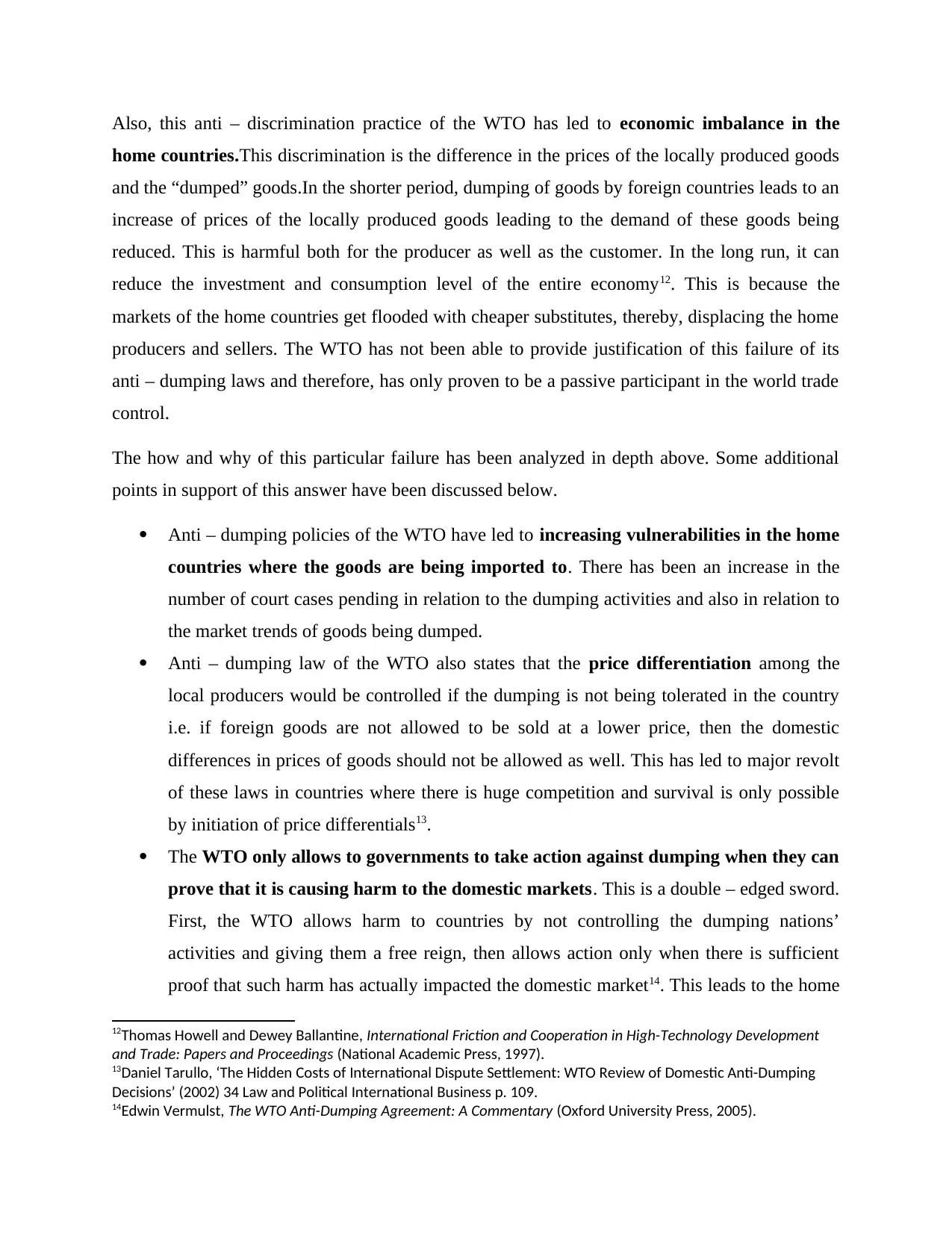
Also, this anti – discrimination practice of the WTO has led to economic imbalance in the
home countries.This discrimination is the difference in the prices of the locally produced goods
and the “dumped” goods.In the shorter period, dumping of goods by foreign countries leads to an
increase of prices of the locally produced goods leading to the demand of these goods being
reduced. This is harmful both for the producer as well as the customer. In the long run, it can
reduce the investment and consumption level of the entire economy12. This is because the
markets of the home countries get flooded with cheaper substitutes, thereby, displacing the home
producers and sellers. The WTO has not been able to provide justification of this failure of its
anti – dumping laws and therefore, has only proven to be a passive participant in the world trade
control.
The how and why of this particular failure has been analyzed in depth above. Some additional
points in support of this answer have been discussed below.
Anti – dumping policies of the WTO have led to increasing vulnerabilities in the home
countries where the goods are being imported to. There has been an increase in the
number of court cases pending in relation to the dumping activities and also in relation to
the market trends of goods being dumped.
Anti – dumping law of the WTO also states that the price differentiation among the
local producers would be controlled if the dumping is not being tolerated in the country
i.e. if foreign goods are not allowed to be sold at a lower price, then the domestic
differences in prices of goods should not be allowed as well. This has led to major revolt
of these laws in countries where there is huge competition and survival is only possible
by initiation of price differentials13.
The WTO only allows to governments to take action against dumping when they can
prove that it is causing harm to the domestic markets. This is a double – edged sword.
First, the WTO allows harm to countries by not controlling the dumping nations’
activities and giving them a free reign, then allows action only when there is sufficient
proof that such harm has actually impacted the domestic market14. This leads to the home
12Thomas Howell and Dewey Ballantine, International Friction and Cooperation in High-Technology Development
and Trade: Papers and Proceedings (National Academic Press, 1997).
13Daniel Tarullo, ‘The Hidden Costs of International Dispute Settlement: WTO Review of Domestic Anti-Dumping
Decisions’ (2002) 34 Law and Political International Business p. 109.
14Edwin Vermulst, The WTO Anti-Dumping Agreement: A Commentary (Oxford University Press, 2005).
home countries.This discrimination is the difference in the prices of the locally produced goods
and the “dumped” goods.In the shorter period, dumping of goods by foreign countries leads to an
increase of prices of the locally produced goods leading to the demand of these goods being
reduced. This is harmful both for the producer as well as the customer. In the long run, it can
reduce the investment and consumption level of the entire economy12. This is because the
markets of the home countries get flooded with cheaper substitutes, thereby, displacing the home
producers and sellers. The WTO has not been able to provide justification of this failure of its
anti – dumping laws and therefore, has only proven to be a passive participant in the world trade
control.
The how and why of this particular failure has been analyzed in depth above. Some additional
points in support of this answer have been discussed below.
Anti – dumping policies of the WTO have led to increasing vulnerabilities in the home
countries where the goods are being imported to. There has been an increase in the
number of court cases pending in relation to the dumping activities and also in relation to
the market trends of goods being dumped.
Anti – dumping law of the WTO also states that the price differentiation among the
local producers would be controlled if the dumping is not being tolerated in the country
i.e. if foreign goods are not allowed to be sold at a lower price, then the domestic
differences in prices of goods should not be allowed as well. This has led to major revolt
of these laws in countries where there is huge competition and survival is only possible
by initiation of price differentials13.
The WTO only allows to governments to take action against dumping when they can
prove that it is causing harm to the domestic markets. This is a double – edged sword.
First, the WTO allows harm to countries by not controlling the dumping nations’
activities and giving them a free reign, then allows action only when there is sufficient
proof that such harm has actually impacted the domestic market14. This leads to the home
12Thomas Howell and Dewey Ballantine, International Friction and Cooperation in High-Technology Development
and Trade: Papers and Proceedings (National Academic Press, 1997).
13Daniel Tarullo, ‘The Hidden Costs of International Dispute Settlement: WTO Review of Domestic Anti-Dumping
Decisions’ (2002) 34 Law and Political International Business p. 109.
14Edwin Vermulst, The WTO Anti-Dumping Agreement: A Commentary (Oxford University Press, 2005).
⊘ This is a preview!⊘
Do you want full access?
Subscribe today to unlock all pages.

Trusted by 1+ million students worldwide
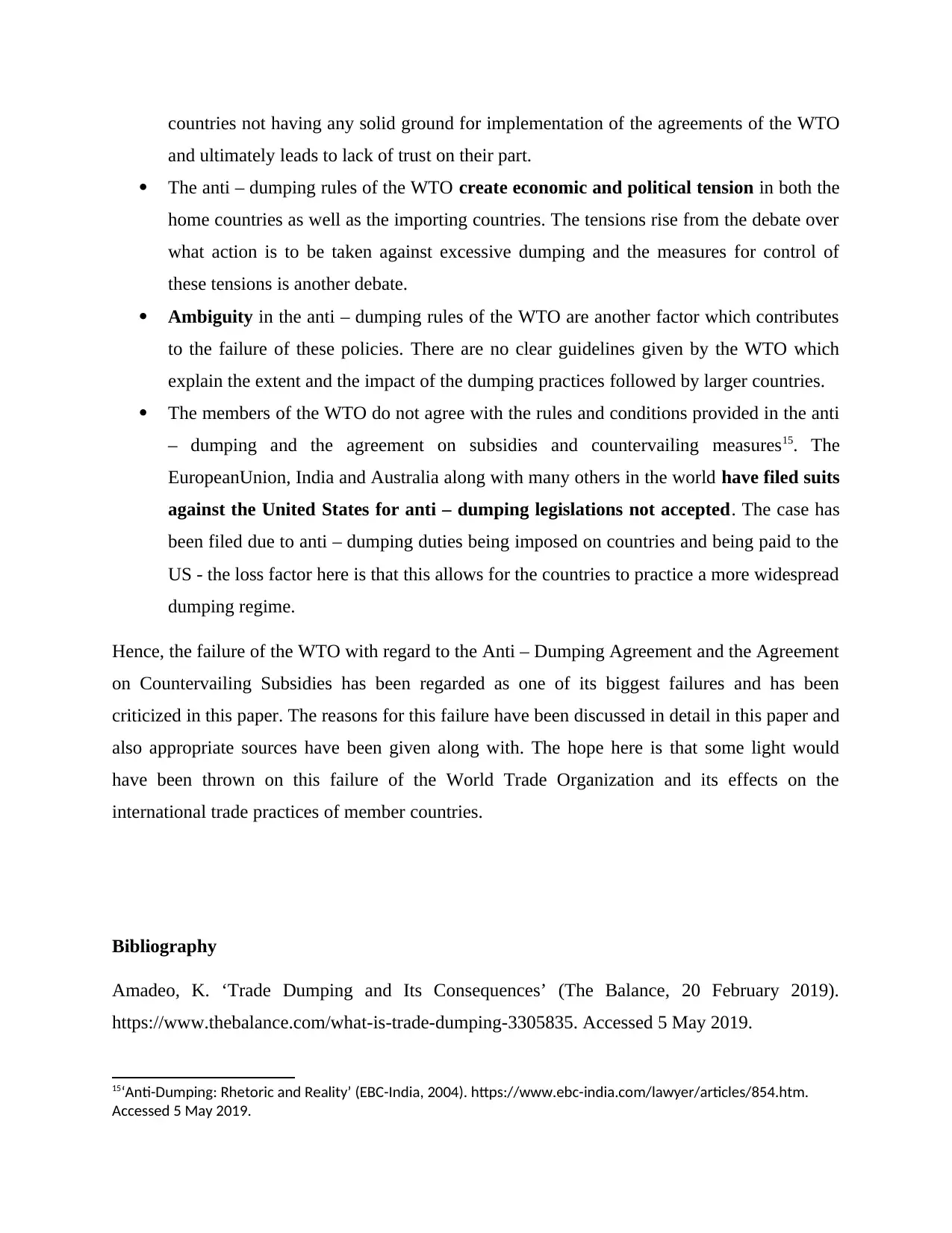
countries not having any solid ground for implementation of the agreements of the WTO
and ultimately leads to lack of trust on their part.
The anti – dumping rules of the WTO create economic and political tension in both the
home countries as well as the importing countries. The tensions rise from the debate over
what action is to be taken against excessive dumping and the measures for control of
these tensions is another debate.
Ambiguity in the anti – dumping rules of the WTO are another factor which contributes
to the failure of these policies. There are no clear guidelines given by the WTO which
explain the extent and the impact of the dumping practices followed by larger countries.
The members of the WTO do not agree with the rules and conditions provided in the anti
– dumping and the agreement on subsidies and countervailing measures15. The
EuropeanUnion, India and Australia along with many others in the world have filed suits
against the United States for anti – dumping legislations not accepted. The case has
been filed due to anti – dumping duties being imposed on countries and being paid to the
US - the loss factor here is that this allows for the countries to practice a more widespread
dumping regime.
Hence, the failure of the WTO with regard to the Anti – Dumping Agreement and the Agreement
on Countervailing Subsidies has been regarded as one of its biggest failures and has been
criticized in this paper. The reasons for this failure have been discussed in detail in this paper and
also appropriate sources have been given along with. The hope here is that some light would
have been thrown on this failure of the World Trade Organization and its effects on the
international trade practices of member countries.
Bibliography
Amadeo, K. ‘Trade Dumping and Its Consequences’ (The Balance, 20 February 2019).
https://www.thebalance.com/what-is-trade-dumping-3305835. Accessed 5 May 2019.
15‘Anti-Dumping: Rhetoric and Reality’ (EBC-India, 2004). https://www.ebc-india.com/lawyer/articles/854.htm.
Accessed 5 May 2019.
and ultimately leads to lack of trust on their part.
The anti – dumping rules of the WTO create economic and political tension in both the
home countries as well as the importing countries. The tensions rise from the debate over
what action is to be taken against excessive dumping and the measures for control of
these tensions is another debate.
Ambiguity in the anti – dumping rules of the WTO are another factor which contributes
to the failure of these policies. There are no clear guidelines given by the WTO which
explain the extent and the impact of the dumping practices followed by larger countries.
The members of the WTO do not agree with the rules and conditions provided in the anti
– dumping and the agreement on subsidies and countervailing measures15. The
EuropeanUnion, India and Australia along with many others in the world have filed suits
against the United States for anti – dumping legislations not accepted. The case has
been filed due to anti – dumping duties being imposed on countries and being paid to the
US - the loss factor here is that this allows for the countries to practice a more widespread
dumping regime.
Hence, the failure of the WTO with regard to the Anti – Dumping Agreement and the Agreement
on Countervailing Subsidies has been regarded as one of its biggest failures and has been
criticized in this paper. The reasons for this failure have been discussed in detail in this paper and
also appropriate sources have been given along with. The hope here is that some light would
have been thrown on this failure of the World Trade Organization and its effects on the
international trade practices of member countries.
Bibliography
Amadeo, K. ‘Trade Dumping and Its Consequences’ (The Balance, 20 February 2019).
https://www.thebalance.com/what-is-trade-dumping-3305835. Accessed 5 May 2019.
15‘Anti-Dumping: Rhetoric and Reality’ (EBC-India, 2004). https://www.ebc-india.com/lawyer/articles/854.htm.
Accessed 5 May 2019.
Paraphrase This Document
Need a fresh take? Get an instant paraphrase of this document with our AI Paraphraser
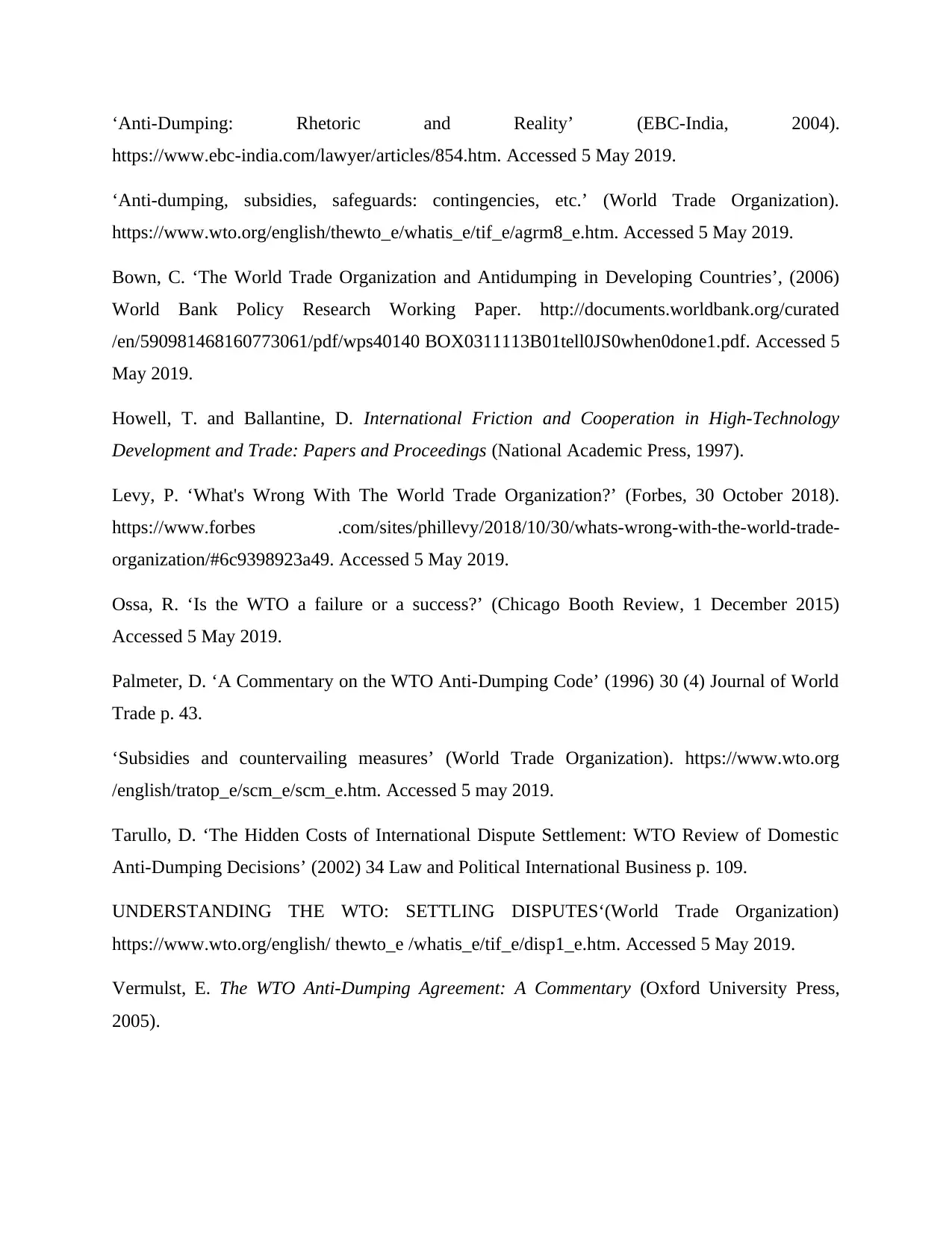
‘Anti-Dumping: Rhetoric and Reality’ (EBC-India, 2004).
https://www.ebc-india.com/lawyer/articles/854.htm. Accessed 5 May 2019.
‘Anti-dumping, subsidies, safeguards: contingencies, etc.’ (World Trade Organization).
https://www.wto.org/english/thewto_e/whatis_e/tif_e/agrm8_e.htm. Accessed 5 May 2019.
Bown, C. ‘The World Trade Organization and Antidumping in Developing Countries’, (2006)
World Bank Policy Research Working Paper. http://documents.worldbank.org/curated
/en/590981468160773061/pdf/wps40140 BOX0311113B01tell0JS0when0done1.pdf. Accessed 5
May 2019.
Howell, T. and Ballantine, D. International Friction and Cooperation in High-Technology
Development and Trade: Papers and Proceedings (National Academic Press, 1997).
Levy, P. ‘What's Wrong With The World Trade Organization?’ (Forbes, 30 October 2018).
https://www.forbes .com/sites/phillevy/2018/10/30/whats-wrong-with-the-world-trade-
organization/#6c9398923a49. Accessed 5 May 2019.
Ossa, R. ‘Is the WTO a failure or a success?’ (Chicago Booth Review, 1 December 2015)
Accessed 5 May 2019.
Palmeter, D. ‘A Commentary on the WTO Anti-Dumping Code’ (1996) 30 (4) Journal of World
Trade p. 43.
‘Subsidies and countervailing measures’ (World Trade Organization). https://www.wto.org
/english/tratop_e/scm_e/scm_e.htm. Accessed 5 may 2019.
Tarullo, D. ‘The Hidden Costs of International Dispute Settlement: WTO Review of Domestic
Anti-Dumping Decisions’ (2002) 34 Law and Political International Business p. 109.
UNDERSTANDING THE WTO: SETTLING DISPUTES‘(World Trade Organization)
https://www.wto.org/english/ thewto_e /whatis_e/tif_e/disp1_e.htm. Accessed 5 May 2019.
Vermulst, E. The WTO Anti-Dumping Agreement: A Commentary (Oxford University Press,
2005).
https://www.ebc-india.com/lawyer/articles/854.htm. Accessed 5 May 2019.
‘Anti-dumping, subsidies, safeguards: contingencies, etc.’ (World Trade Organization).
https://www.wto.org/english/thewto_e/whatis_e/tif_e/agrm8_e.htm. Accessed 5 May 2019.
Bown, C. ‘The World Trade Organization and Antidumping in Developing Countries’, (2006)
World Bank Policy Research Working Paper. http://documents.worldbank.org/curated
/en/590981468160773061/pdf/wps40140 BOX0311113B01tell0JS0when0done1.pdf. Accessed 5
May 2019.
Howell, T. and Ballantine, D. International Friction and Cooperation in High-Technology
Development and Trade: Papers and Proceedings (National Academic Press, 1997).
Levy, P. ‘What's Wrong With The World Trade Organization?’ (Forbes, 30 October 2018).
https://www.forbes .com/sites/phillevy/2018/10/30/whats-wrong-with-the-world-trade-
organization/#6c9398923a49. Accessed 5 May 2019.
Ossa, R. ‘Is the WTO a failure or a success?’ (Chicago Booth Review, 1 December 2015)
Accessed 5 May 2019.
Palmeter, D. ‘A Commentary on the WTO Anti-Dumping Code’ (1996) 30 (4) Journal of World
Trade p. 43.
‘Subsidies and countervailing measures’ (World Trade Organization). https://www.wto.org
/english/tratop_e/scm_e/scm_e.htm. Accessed 5 may 2019.
Tarullo, D. ‘The Hidden Costs of International Dispute Settlement: WTO Review of Domestic
Anti-Dumping Decisions’ (2002) 34 Law and Political International Business p. 109.
UNDERSTANDING THE WTO: SETTLING DISPUTES‘(World Trade Organization)
https://www.wto.org/english/ thewto_e /whatis_e/tif_e/disp1_e.htm. Accessed 5 May 2019.
Vermulst, E. The WTO Anti-Dumping Agreement: A Commentary (Oxford University Press,
2005).
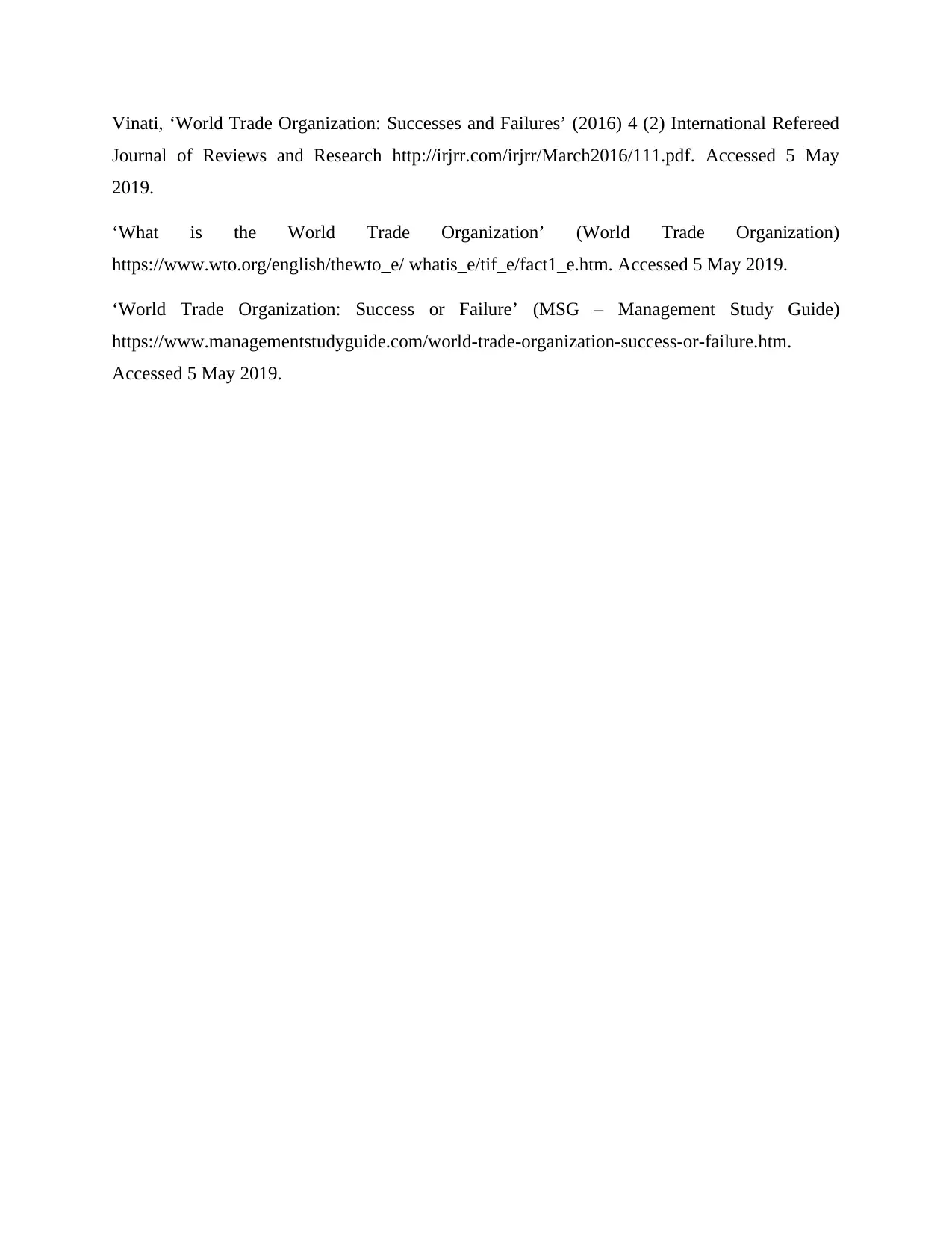
Vinati, ‘World Trade Organization: Successes and Failures’ (2016) 4 (2) International Refereed
Journal of Reviews and Research http://irjrr.com/irjrr/March2016/111.pdf. Accessed 5 May
2019.
‘What is the World Trade Organization’ (World Trade Organization)
https://www.wto.org/english/thewto_e/ whatis_e/tif_e/fact1_e.htm. Accessed 5 May 2019.
‘World Trade Organization: Success or Failure’ (MSG – Management Study Guide)
https://www.managementstudyguide.com/world-trade-organization-success-or-failure.htm.
Accessed 5 May 2019.
Journal of Reviews and Research http://irjrr.com/irjrr/March2016/111.pdf. Accessed 5 May
2019.
‘What is the World Trade Organization’ (World Trade Organization)
https://www.wto.org/english/thewto_e/ whatis_e/tif_e/fact1_e.htm. Accessed 5 May 2019.
‘World Trade Organization: Success or Failure’ (MSG – Management Study Guide)
https://www.managementstudyguide.com/world-trade-organization-success-or-failure.htm.
Accessed 5 May 2019.
⊘ This is a preview!⊘
Do you want full access?
Subscribe today to unlock all pages.

Trusted by 1+ million students worldwide
1 out of 9
Related Documents
Your All-in-One AI-Powered Toolkit for Academic Success.
+13062052269
info@desklib.com
Available 24*7 on WhatsApp / Email
![[object Object]](/_next/static/media/star-bottom.7253800d.svg)
Unlock your academic potential
Copyright © 2020–2025 A2Z Services. All Rights Reserved. Developed and managed by ZUCOL.




